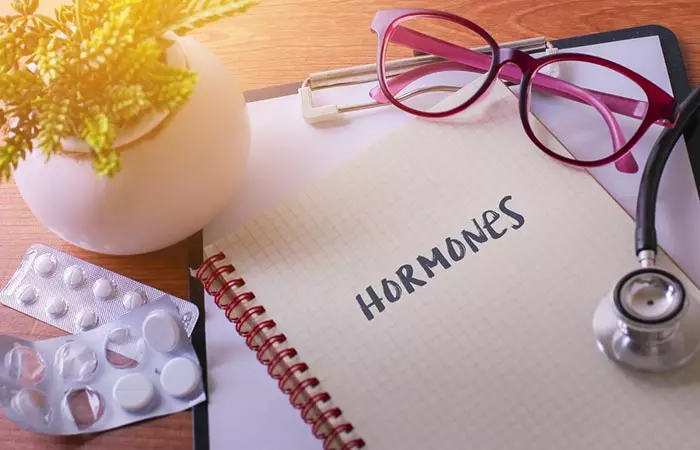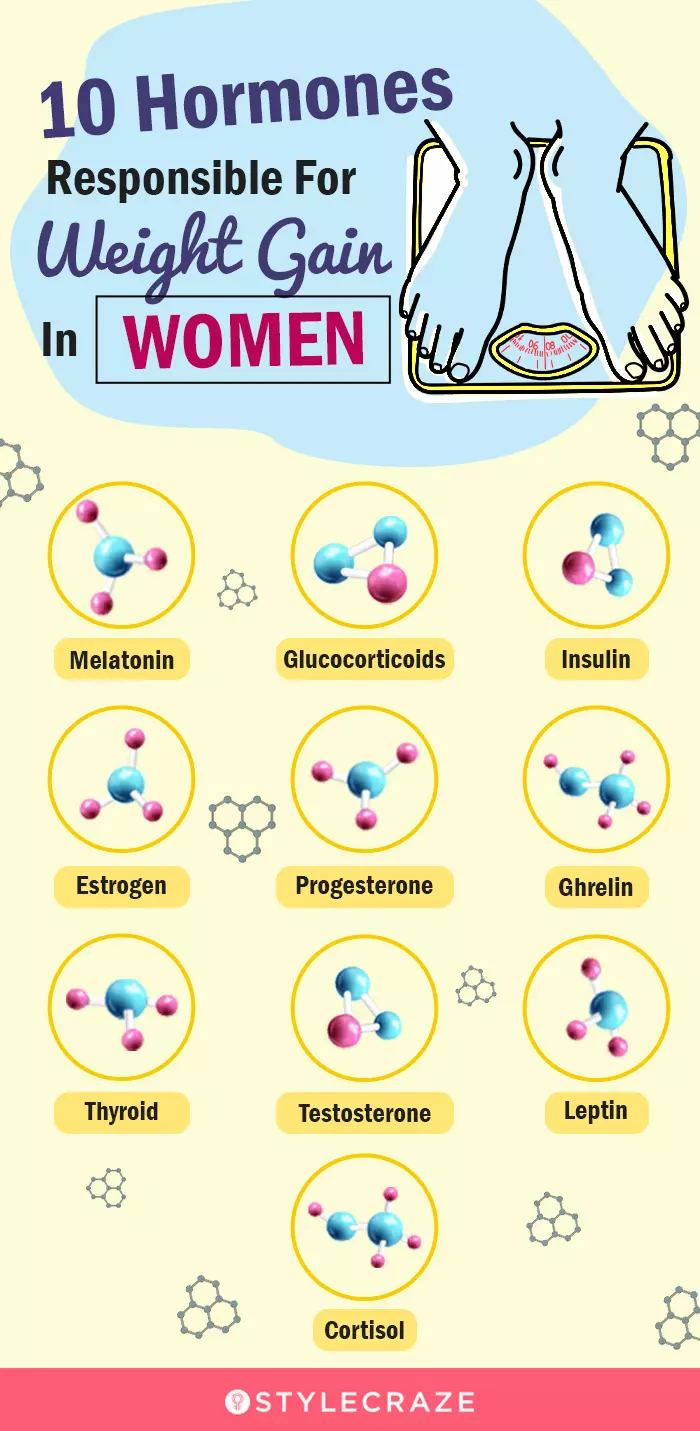What Is Progesterone?
Progesterone is a vital hormone in the human endocrine system. It is primarily produced in the ovaries and in smaller quantities in the adrenal glands (1). It plays an important role in regulating the menstrual cycle and supporting pregnancy. Progesterone is commonly referred to as the ‘pregnancy hormone’ because its levels rise significantly during pregnancy. This helps maintain the uterine lining and prevent contractions that could lead to a miscarriage (1). In non-pregnant individuals, progesterone helps prepare the uterus for potential pregnancy each month. If fertilization does not occur, its levels drop, triggering menstruation (1). Progesterone also influences various other physiological functions, such as maintaining bone density and promoting a sense of calm and well-being (1). Its role in such biological functions can affect your body weight as well. Learn more about it below.
Does Progesterone Cause Weight Gain?
Progesterone may or may not cause weight gain in women. Let’s understand what effect progesterone has on a woman’s body weight.
Progesterone Increases Hunger It is a known fact that consuming more calories and not burning enough calories can lead to weight gain. But what if your appetite was under the control of a few hormones (like progesterone)? It is true that sex hormones, including progesterone and testosterone, increase appetite (3). Since progesterone levels are high during pregnancy, there is a possibility that it may increase hunger in this period. A scientific study shows that increased weight gain in women could also be triggered due to Progestin (birth control), which may increase the chances of binge eating in women during the luteal phasei The second part of the menstrual cycle that begins around day 15 of a 28-day cycle and ends with the first day of your period. (4). However, more research needs to be conducted to confirm this finding. Low Progesterone Levels Cause Weight Loss Menopause, miscarriages, and ovarian diseases cause progesterone levels to drop. This may elevate estrogen levels. Estrogen is a female hormone that also helps prepare the body for pregnancy and lactation (5). However, estrogen also reduces hunger (3). This means that reduced progesterone and increased estrogen levels may lead to weight loss.
So, can progesterone cause weight gain? Yes, it can. From the above explanation, we can see that progesterone is a primary driver of weight gain in women. However, there are many other hormones that also can cause weight gain. Scroll down to know more.
Other Hormones That Cause Weight Gain
Insulin Insulin is a hormone that helps in the uptake of glucose in the bloodstream by cells. Glucose is then converted to usable energy (ATP) in the cells. However, the body sometimes may not produce insulin or the cells may not recognize insulin, leading to insulin resistance. This prevents glucose uptake, potentially leading to diabetes type 1 and 2 (6). With increased blood sugar levels, the excess sugar does not get used up and gets stored in the body. Thyroid Thyroid hormones regulate metabolism, fat oxidationi A biochemical process that breaks down fatty acids to generate energy for the muscles and decrease body fat. , and food intake. Imbalance in thyroid function or reduced secretion of thyroid hormones, also known as hypothyroidism, reduces metabolism and increases BMIi Body mass index is the measurement of body fat based on the height and weight ratio of an adult person. and the risk of obesity (7).
Leptin And Ghrelin Leptin is a hormone that reduces hunger. However, people with obesity are found to be leptin-resistant, which causes them to consume more calories (8). Increased leptin levels and decreased concentration of adiponectin has been associated with abdominal obesity in people with severe coronary artery disease (9). Ghrelin, on the other hand, is a hunger-stimulating hormone. Overproduction of ghrelin stimulates excessive hunger and increases one’s food intake (10). Cortisol Cortisol is a stress hormone. Excessive cortisol stimulates hunger and increases food intake. Scientists have also found a direct link between elevated cortisol levels and increased abdominal obesity, metabolic syndrome, and cardiovascular disease (11), (12). Testosterone Testosterone is a male hormone and is present in negligible amounts in women. However, women undergoing menopause have higher testosterone levels, which can increase the chances of developing visceral fat (13).
Talk to your doctor and get a thorough check-up done to understand if your weight gain is due to progesterone or any other hormone or other factors (such as genetic predisposition or medications like anti-depressants). Your doctor may prescribe medicines. If you are going through menopause, you may also be prescribed hormone replacement therapy. But what is it? How does it work?
Can Hormone Replacement Therapy Help?
Hormone replacement therapy is prescribed for women going through menopause. It is the most effective treatment for relieving menopausal symptoms (14). Menopause increases the risk of obesity and cardiovascular disease. HRT is mainly used to relieve health risks associated with menopause, but research has shown that HRT with estradiol and progesterone also helps reduce weight and waist to hip ratio (14), (15). The American Association for Cancer Research also found that a BMI reduction due to HRT may reduce the risk of endometrial canceri A type of cancer that affects the inner lining of the uterus and result in the abnormal growth of cells. (16). Another study confirmed that HRT not only reduces body weight in postmenopausal women but also reduces the risk of breast cancer (17). Scientists have also found that HRT reduces muscle loss in postmenopausal women (18). However, other studies suggest further investigation to confirm positive outcomes regarding HRT and prevention of muscle loss in postmenopausal women (19). Hormone replacement therapy is beneficial for women going through menopause and/or postmenopausal women as it helps manage the body composition changes that occur during or after this period. It not only helps reduce body weight but also lowers the risk of other diseases and conditions. But what should women do to prevent hormonal weight gain if they are not going through menopause? A crucial step forward is to modify one’s lifestyle habits. The following section lays out a complete plan of how to go about it.
Lifestyle Changes To Prevent Hormonal Weight Gain
Lifestyle interventions work best for weight gain. Here are a few ways you can give your body and brain the cue and take charge of your body:
Consume fiber-rich foods: Vegetables, low-GI fruits, and whole grains are loaded with dietary fiber. Dietary fiber takes longer to digest and helps reduce hunger. Dietary fiber also helps increase good gut bacteria and promotes better digestion (20). Consume protein with each meal: Lean protein sources like chicken breast without skin, fish, tofu, mushrooms, lentils, and beans are rich in protein. Proteins take longer to digest and increase satiety (21). Consume a source of protein with each meal to reduce hunger.
Consume healthy fats: Healthy fats help reduce inflammation and inflammation-induced weight gain (22), (23). Foods like fatty fish, avocado, olive oil, nuts, and seeds are great sources of healthy fats that you can add to your diet. Practice portion control: Practice portion control to avoid consuming excess calories (24). For instance, it is very easy to consume more nuts. Nuts are usually high in calories. Unless you practice portion control, even healthy foods can cause weight gain. Avoid junk and processed foods: Fries, pizza, burger, frozen foods, salami, sausage, canned food, and packaged drinks are loaded with sugar, salt, trans-fats, preservatives, and other additives. These are not good for the body and can affect the body’s metabolism and increase bad cholesterol (25).According to Harvard School of Public Health, there is evidence showing an association between certain types of food processing and poor health outcomes (especially highly- or ultra-processed foods). This association applies mainly to ultra-processed foods that contain added sugars, excess sodium, and unhealthy fats (26). Mix cardio and strength training: Exercising and keeping yourself active is very important to burn calories and maintain mental health. Three days of cardio and two days of strength training are ideal to burn fat and preserve lean muscle(27). Talk to your trainer to customize your exercise routine according to your body needs. You can also play a sport, dance, or swim to keep your body active. Learn a new skill: Do you always feel stressed and anxious? A good way to channelize your energy is to learn a new skill. Pick a hobby, enroll in an online class, or teach your best skills to the world. The process of learning will keep your brain engaged in a positive activity that will lower your stress and improve brain function (28). Sleep to reboot: Sleep deprivation is a major cause of weight gain. Get at least 6 to 7 hours of sleep every night. Switch off your electronics, listen to soothing music, and/or read a book. It is also important to sleep in a dark room to help your body produce melatonin, a hormone that maintains sleep-wake cycles (29).
Can I just take progesterone without estrogen? Yes, you can take just progesterone on its own, especially during menopause. What are the signs of low progesterone? Irregular periods, short cycles, premenstrual spotting, frequent mood changes, anxiety, sleep disturbances, and depression may all hint at low levels of progesterone. How do you activate leptin? Including more fiber, limiting fructose consumption, improving protein and omega-3 intake, and maintaining a perfectly balanced diet may help activate leptin levels. What are the symptoms of high progesterone? Weight fluctuations, fatigue, breast swelling, pain in the legs, and mood swings are some symptoms of high progesterone. What happens after taking progesterone for 10 days? Progesterone may help regulate your menstrual cycle. After taking it for 10 days, the progesterone tricks the uterus into menstruating. Is progesterone bad for fertility? No, progesterone is not bad for fertility. In fact, low levels of progesterone might cause issues in fertility. How long after starting progesterone therapy might weight gain occur? Progesterone therapy does not always cause weight gain and it is not a direct cause of it. Therefore, it is not possible to say that weight gain will definitely occur after this therapy. Explore the intriguing relationship between progesterone and weight and how hormonal fluctuations can influence your body’s shape and size. Learn how progesterone affects your weight and how to manage it for a healthier lifestyle with this informative video. Click on the play button now!










